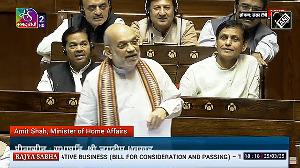But Ramesh's happiness isn't going to cheer Radhamohan Dash, a farmer in the Naladia village in Orissa's Keonjhar district. Dash has been finding it difficult to find enough farm labourers during the harvesting season, even though he has raised wages. The increase in NREGP wages is going to inflate his wage bill further.
"Workers in our village have already become scarce. The hike in NREGP wages will make farming unviable," Dash says.
Ramesh and Dash are symbols of the new hope and despair of villagers across the country. Workers are happy, but farm owners are concerned that the higher wages would divert labour from farms and push up costs further.
That's the central theme of a Business Standard survey of NREGP sites in five states -- Gujarat, Orissa, Madhya Pradesh, West Bengal and Chhattisgarh.
A look at the way agricultural wages have gone up since 2005-06 in some of the states makes it clear that NREGP has made agriculture more expensive for farmers and more paying for workers.
In Gujarat, agricultural wages, which were Rs 50 a day in 2005-06, doubled last year. In Madhya Pradesh, farm wages went up from Rs 58 in 2005-06 to Rs 67 the following year and Rs 85 in 2007-08. It is Rs 91 now -- a compounded annual growth rate of 15.78 per cent.
In Orissa, it went up from Rs 55 in 2005 to Rs 70 in 2008. It is set to increase to Rs 90 this year. That would be a CAGR increase of over 17 per cent over three years.
According to Rajakutty, director, National Institute of Rural Development, higher wages for NREGP are definitely bad news for agriculture. He quotes an NIRD study that found that even the existing NREGP wages have led to agricultural wages shooting up 20 per cent in the states they surveyed.
Activists and researchers on NREGP, however, agreed that the increase in wages was a good thing, provided it was translated into real terms and not applied to states that were already paying higher wages.
Nikhil De of the Mazdoor Kisan Shakti Sangathan said, "The increase in the minimum wages is good, but only if it is in real terms. That is, wages a few years from now should be able to fetch what Rs 100 fetches today. It should not remain Rs 100 forever, but change according to how much is needed to buy what the amount can buy today."
Jean Dreze, economist and researcher on NREGP, agreed. While the correlation of the wage under NREGP to that in the farm "is a complex matter, personally I would not be opposed to a national norm of Rs 100 a day, provided that it is in real terms, i.e. adjusted every year in accordance with the price level. Most states already have minimum wages of around Rs 100 a day in any case, or are moving rapidly in that direction. However, there are important legal issues to consider, and the National Rural Employment Guarantee Act may need to be amended to reconcile this with the Minimum Wages Act".
The survey also found that all state governments, except Gujarat, are paying less than Rs 100 for NREGP currently. But in states like West Bengal, the wages hardly matter, since getting work under the scheme is a rarity in the village that was visited. So, getting even the existing wage is a dream.
In Chhattisgarh, the wages paid after measurement of work are just a fraction of the minimum wage. And in Madhya Pradesh, the wages in other sectors are more attractive, but NREGP workers are getting whatever they are entitled to. The records of workers in every village of the country and the wages paid to them are on the NREGP website.
The survey also brings up a common complaint: the cost of opening a bank account for NREGP payments. Most labourers are unable to maintain the minimum balance needed to operate an account. This is significant since the government is considering using banks as the single point to disburse NREGP wages, in an effort to eliminate corruption.
With inputs from Bishnu Dash in Bhubaneswar, Shashikant Trivedi in Bhopal, R Krishna Das in Raipur, Margaret Williams in Nadia, and Maulik Pathak in Ahmedabad







 © 2025
© 2025